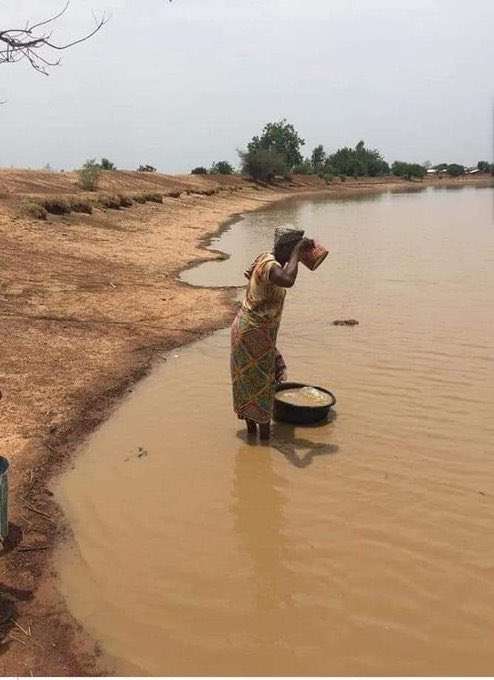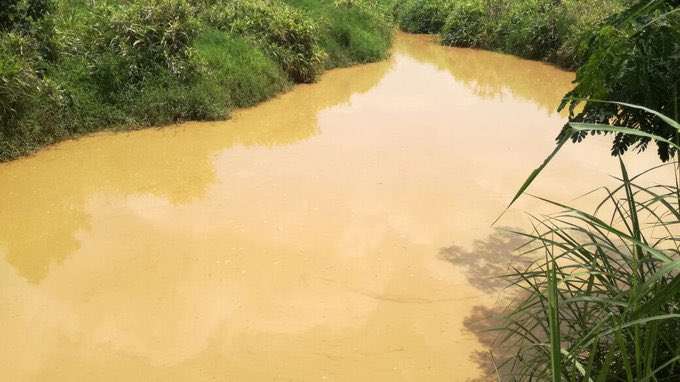In a concerning development, the Ghana Water Company Limited (GWCL) has raised alarm over the detrimental impact of illegal mining activities on the Pra River, a critical water source in the country. The company reported a significant disruption to its operations, resulting in a drastic drop in water production from 70 to 40 percent nationwide.
The Minority on the Works and Housing Committee has taken a strong stance on the matter, calling for the immediate removal of the Lands Minister and his deputies.
The Ranking Member on the Works and Housing Committee, Hon. Vincent Oppong Asamoah, led the charge, expressing a firm belief that removing the sector ministers responsible for lands and forestry would be a decisive step towards achieving the desired outcomes in the fight against illegal mining.
“Firing is the worst a minister could suffer over underperformance. If you have a Lands Minister and two deputies in charge of our lands and forestry and they cannot protect our mineral body, the best you can do to them is to sack them.
“Whoever comes next must be given clear directives on what the presidency intends to achieve in that area.”
Hon. Vincent Oppong Asamoah, Ranking Member on the Works and Housing Committee
The Minority accused the government officials of failing to effectively protect Ghana’s water bodies and rivers from the devastating effects of illegal mining. The call for action reflects growing frustration and demands for accountability in addressing the galamsey crisis.
According to Mr. Asamoah, the sacking of these ministers would send a strong message about accountability and performance within the government.
Mr. Asamoah’s remarks highlighted a growing sense of urgency among lawmakers and the public alike, as illegal mining continues to wreak havoc on Ghana’s environment.
Particularly troubling is the fact that even the hometown of Deputy Lands Minister Mireku Duker has not been spared from the galamsey menace, underscoring the pervasive nature of the problem.
Despite the growing calls for action, there is a sense of skepticism among some officials about whether these measures will be implemented before the upcoming general elections.
Hon. Asamoah, the Ranking Member on the Works and Housing Committee expressed doubts about the political will to address the issue head-on, particularly in the run-up to the elections when political considerations often take precedence over long-term policy decisions.
Measures Against Illegal Mining Impact

Meanwhile, the Water and Sanitation Minister, Lydia Alhassan, has attempted to reassure the public that the government is not sitting idly by. She stated that her ministry has already begun implementing measures to mitigate the impact of illegal mining on water quality.
“The situation is getting worse by the day,” Minister Alhassan acknowledged. “However, we at the ministry have put measures in place to ensure that the situation is minimized.”
Minister Alhassan did not provide specific details about the measures being taken, but her comments reflected the government’s recognition of the severity of the crisis. The public, however, remains skeptical, with many questioning whether these interventions will be enough to reverse the damage already done to the nation’s water bodies.
The Pra River, a vital water source for GWCL’s operations, has been particularly impacted by illegal mining activities, leading to a sharp decline in water production capacity. The company’s struggles highlight the urgent need for comprehensive measures to curb illegal mining and safeguard Ghana’s water resources.
Residents in the Central Region, including key areas such as Cape Coast, Elmina, and surrounding towns, have been particularly hard hit by the crisis. These areas have experienced prolonged water shortages, with some residents going without water for days.
The situation has raised serious concerns about regional water security, as the galamsey activities continue to compromise the GWCL’s ability to provide clean and accessible water to the public.
In light of the worsening situation, the Managing Director of the Ghana Water Company, Clifford Braimah, has proposed that the government take more drastic measures to protect the country’s water sources.

“The situation is dire, and we need to act swiftly. The military’s involvement could be the turning point in our fight against illegal mining.”
Clifford Braimah, Managing Director of the Ghana Water Company,
As concerns mount over the escalating threats posed by illegal mining, stakeholders are calling on the government to take decisive action to address the root causes of the issue.
Effective enforcement of existing regulations, enhanced monitoring mechanisms, and sustainable mining practices are essential to mitigate the adverse impacts of galamsey on Ghana’s environment and water security.
The call for accountability and responsible stewardship of the country’s natural resources has never been more urgent.
READ ALSO: Putin Lands In Mongolia




















